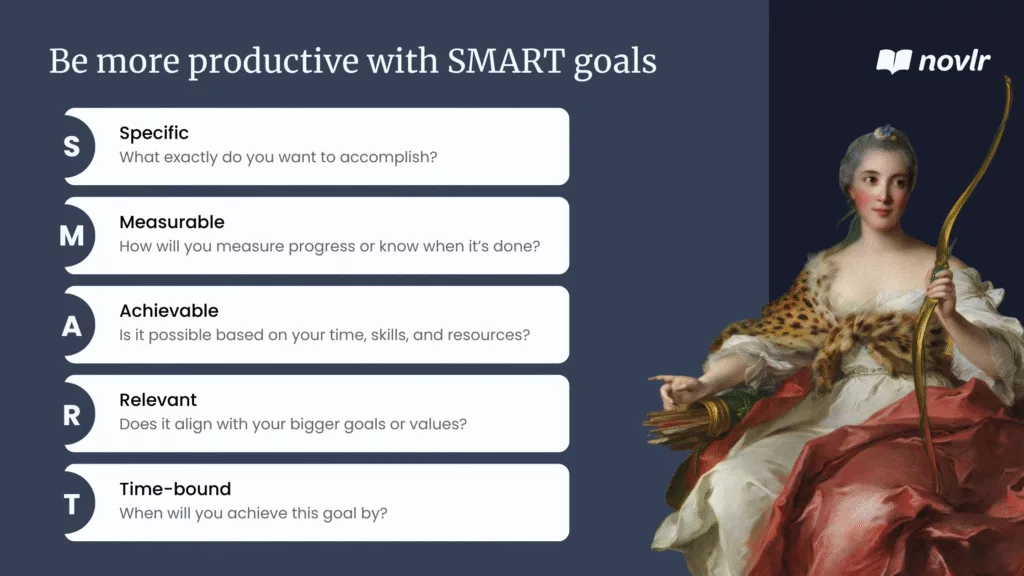
How Setting SMART Goals Can Make Your Writing Time More Productive

As writers, we dream big. Our goals are lofty, and because of that, they can often become overwhelming. We want to complete that novel, publish a collection of short stories, or write a groundbreaking work of non-fiction. But without a clear roadmap, these dreams often remain just dreams, because the task ahead of us feels too overwhelming for us to engage with in a truly meaningful way. That’s where SMART goals come in.
SMART goals are: Specific, Measurable, Achievable, Relevant, and Time-bound.
SMART goals are a way of goal-setting that keeps your dreams achievable and makes you more productive when you come to writing, so let’s break them down and see how they can change your writing flow for the better.

Specific
Vague goals like “write more” or “finish my book” lack direction. Instead, make your goals concrete and, you guessed it, specific.
Examples of specific goals might be:
- Complete the first draft of my science-fiction novel.
- Submit my manuscript to twenty different literary agents.
- Complete a full outline of my non-fiction book.
- Finish the character profiles for my three main characters.
The more specific your goal, the easier it becomes to act on it.
Measurable
If you’re anything like me, you hate numbers. But unfortunately, numbers are a writer’s best friend when it comes to goals. Whether it’s word count, pages, chapters, or time, having measurable targets helps you know exactly where you stand.
And ephemeral goals like “work on my book regularly,” won’t help you get over the finish line. Instead, make sure you have a target that you can track and measure.
Examples of measurable goals might be:
- Write 1,000 words every month.
- Query one literary agent a day.
- Write for 20 minutes every weekday.
- Edit one chapter every week.
Tracking your goals breaks them up and gives you wins. You have something to work toward and you can actively watch your progress, keeping you motivated.
Achievable
While it’s tempting to set ambitious goals like “write a bestseller in three months,” realistic targets serve you better. Creating overly ambitious goals sets you up for failure, because nothing will kill your writing buzz faster than failing to meet your goals.
When setting goals, make sure you think about your current life commitments, writing speed, and experience level. If you’re working full time, perhaps “write for ten minutes each morning before work” is more achievable than “write eight hours a day.”
Relevant
When you first set out on your writing journey, there was a reason. And while those reasons may have grown and evolved over the time you’ve been writing, you will still have a fundamental reason you do what you do.
Every writing goal should align with your broader creative vision. Ask yourself: Why does this project matter to me? How does it fit into my writing career? What do I want to achieve with this project?
For instance, if you want to be a traditionally published author, then you’ll need to build your goals around creating a commercially viable manuscript and submitting to literary agents. But if you just write for fun, then your goals can be a lot more personal.

Write more, write better, and achieve your goals with Novlr!
Time-bound
Without deadlines, projects can drift endlessly. Some people are great at managing their time, but I’m absolutely awful at prioritising my personal projects.
When setting your goals, give yourself a realistic timeline, which you can then break into smaller achievable milestones.
Examples of time-bound goals might be:
- Complete a 50,000-word first draft in six months.
- Submit a short story to three different competitions by a specific date.
- Complete your manuscript revision in two months.
- Maintain a writing routine for 30 consecutive days.
Having these time-based checkpoints helps maintain momentum and gives you natural review points so you can adjust your goals if needed.
Putting It All Together
Let’s look at some SMART goals in action:
Instead of “I want to write a book,” try: “I will complete the first draft of my 70,000-word historical romance novel by December 31st to prepare for publishing, writing 2,000 words per week and dedicating two hours every Saturday and Sunday morning.”
This goal works because it’s:
- Specific: Historical romance novel with a clear word count.
- Measurable: 2,000 words per week.
- Achievable: Focused weekend writing sessions.
- Relevant: Aligned with your desire to publish.
- Time-bound: Has a clear deadline and weekly targets.
For another example you could try: “ I will complete a detailed, 20-chapter outline for my science-fiction novel in four weeks to give myself a strong base to draft from and spend 20 minutes each weekday brainstorming.”
This goals is:
- Specific: Complete a full outline of my science fiction novel.
- Measurable: Spend 30 minutes each weekday brainstorming.
- Achievable: Broken up into 20 manageable chapters.
- Relevant: Having a strong outline will make drafting the novel more efficient.
- Time-bound: Finish the outline within four weeks.
Making SMART Goals Work for You
Remember, SMART goals are just one way you can set goals to support your writing journey, not chains to bind you. Adjust them as needed, celebrate your progress, and use them to build sustainable writing habits if it’s something that works for your flow. The key is finding the right balance between challenge and achievability.
If you want to test it out, start by setting one SMART goal for your current writing project. Break it down into daily, weekly, or monthly milestones and track your progress. You might be surprised how this simple framework can transform your writing productivity and bring you closer to your writing goals.





























